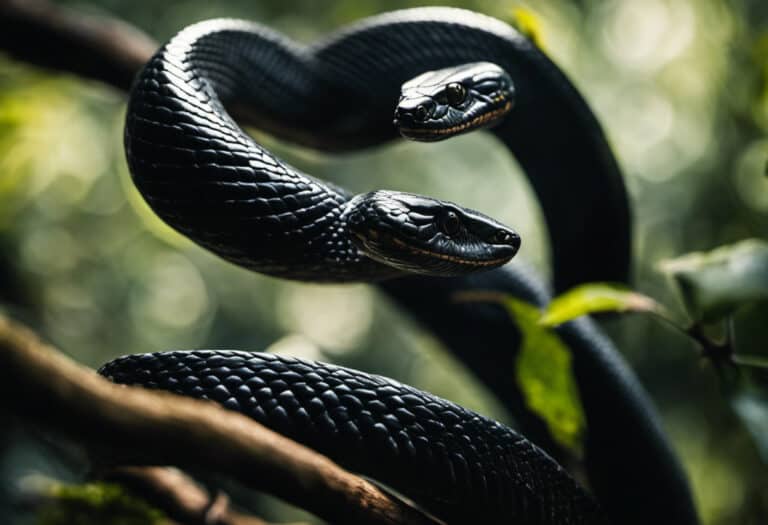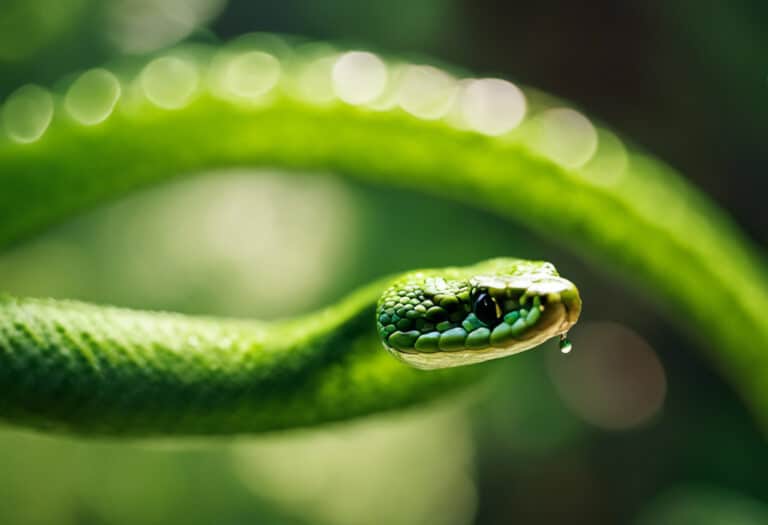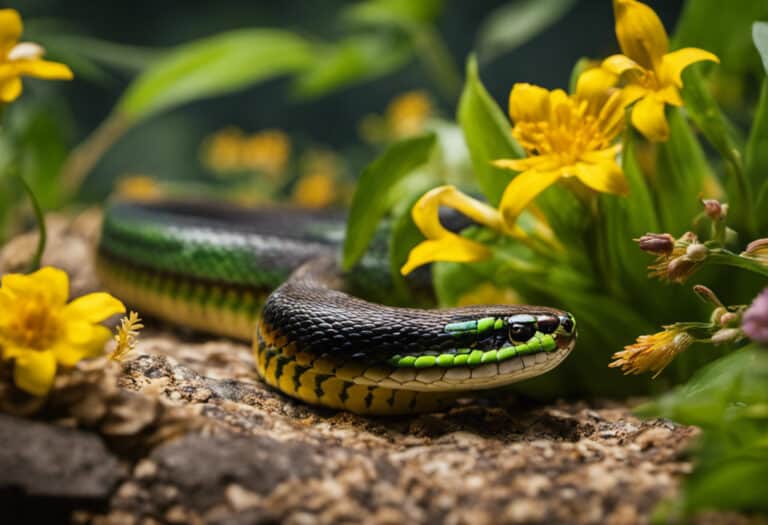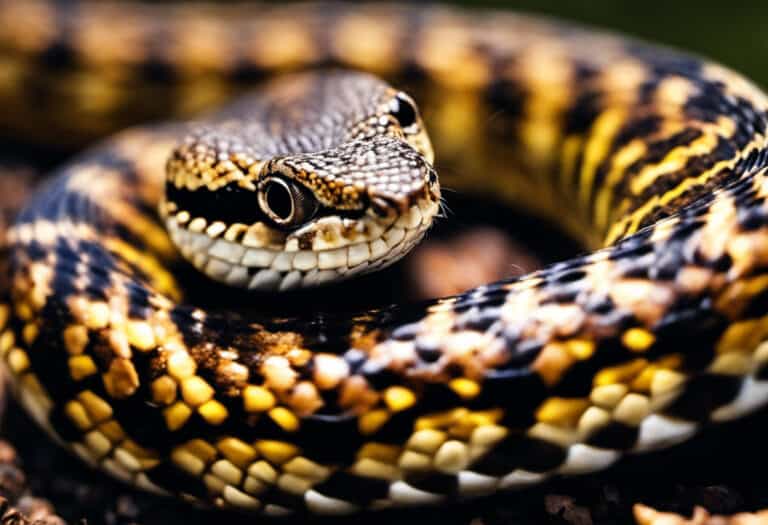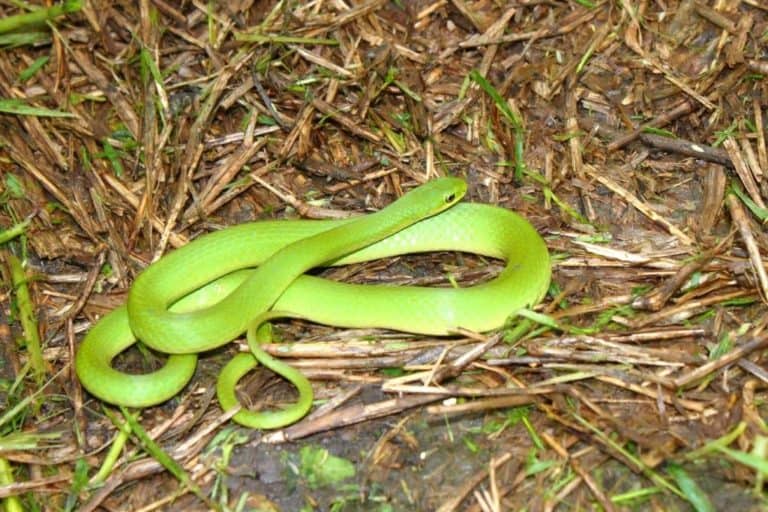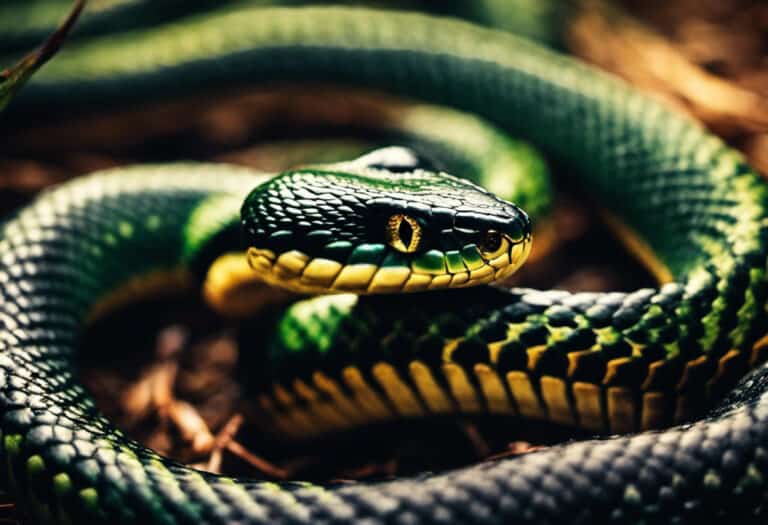Do Snakes Bite in Water?
Are you curious about whether snakes can bite you while you’re in the water? Well, the truth is, they can. Although it’s less likely to happen than on land, snakes like the cottonmouth and water moccasin are capable of biting underwater.
In this article, we’ll explore the reasons behind this behavior, the characteristics of water snakes, and safety precautions to minimize the risk of being bitten.
So, dive in and uncover the fascinating world of snakes in water.
Key Takeaways
- Snakes can bite underwater if provoked or threatened.
- Cottonmouth (water moccasin) and water snakes are common snakes found in or near water, and they are known to bite underwater.
- Snakes may bite underwater due to mistaken identity, defensive reactions, or when they feel threatened and cannot escape.
- It is advisable to be cautious and observant when near water or in snake habitats and to call a wildlife professional if snakes are spotted on your property.
Factors Contributing to Snake Biting Behavior in Water
In water, snakes may bite if they feel threatened or provoked, which can occur due to mistaken identity or defensive reactions. Factors influencing snake aggression underwater are influenced by environmental factors.
Snakes in water may exhibit different behaviors compared to those on land. The impact of environmental factors on snake biting behavior in water can be significant. Water temperature, water clarity, and prey availability are some of the factors that can influence their aggression levels.
For example, warmer water temperatures may make snakes more active and potentially more aggressive.
Additionally, the presence of prey or the lack thereof can also affect their behavior. Understanding these factors can help individuals minimize the risk of snake bites while enjoying water activities.
Stay vigilant and respect the presence of snakes in their natural habitats to ensure freedom and safety.
Understanding the Behavior of Water Snakes
When encountering water snakes, be aware that their behavior can vary, and it’s important to understand their actions. Here are some key points to consider:
-
Factors affecting water snake aggression:
-
Environmental conditions, such as temperature and habitat availability, can influence aggression levels.
-
Seasonal factors, like breeding and territorial instincts, may also contribute to increased aggression.
-
Individual snake temperament and past experiences can impact their behavior in different situations.
-
Human interactions, such as handling or disturbance, can trigger defensive responses in water snakes.
-
Presence of prey or competition for resources can also influence aggression levels.
-
Myths about water snake behavior:
-
Contrary to popular belief, not all water snakes are venomous. Venomous water snakes, like the cottonmouth, are an exception rather than the norm.
-
Non-venomous water snakes, like the northern water snake, may bite if provoked but are generally less aggressive.
-
While water moccasins are feared for their venomous bites, their aggression levels can vary, and they may exhibit defensive behavior only when threatened.
Understanding these factors and dispelling myths can help you make informed decisions and stay safe when encountering water snakes.
Safety Precautions to Minimize the Risk of Snake Bites in Water
To minimize the risk of snake bites in water, it’s important for you to be cautious and observant when near bodies of water or in snake habitats. Preventing snake bites starts with identifying venomous water snakes.
Common snakes found in or near water include the Cottonmouth (water moccasin) and various water snake species.
The Cottonmouth is venomous and poses a greater threat among the venomous snake species in the US. However, it’s important to note that all snakes, regardless of venom, can bite.
When near water, be aware that snakes swim on top of the water, including venomous water snakes, while non-venomous snakes sink below the surface with only their heads visible. By respecting and leaving snakes alone, you can greatly minimize the risk of being bitten.
Stay informed about the types of snakes found in your area and avoid swimming in areas where snakes have been seen. Stay safe and enjoy your time near the water.
Reasons Why Snakes May Bite Underwater
If you encounter a snake underwater and it feels threatened or can’t escape, it will bite. There are common misconceptions about snakes in water that need to be addressed.
Firstly, the role of water temperature in snake biting behavior is often misunderstood. Here are some key points to consider:
- Snakes may inhabit waters when they get too hot or are shedding their skin.
- Bites can occur due to mistaken identity of food or defensive reactions.
- Shallow waters like rivers and streams can lead to accidental encounters with snakes.
- Snakes may be disturbed by humans crossing their path in the water.
- Water helps loosen snake skin and facilitates the shedding process.
Understanding these factors will help you navigate snake encounters in water more effectively and reduce the risk of being bitten.
Stay informed and take necessary precautions to ensure your safety and the well-being of these fascinating creatures.
The Swimming Abilities of Snakes and Their Adaptations for Life in Water
Snakes’ ability to swim is essential for their survival, as they lack arms or legs and would perish if they fell into water without this skill. All snake species have the ability to swim, as it’s a fundamental adaptation for their survival. While some snakes are better swimmers than others, there’s no known snake species that can’t swim.
Snakes have evolved various adaptations for life in water, such as paddle-like tails that allow for efficient swimming. In aquatic habitats, snakes display different behaviors. Some snakes, like the coral snake, swim at high speeds, while others sink below the surface with only their heads visible when stationary.
Understanding snake swimming adaptations and behavior in aquatic habitats is crucial for appreciating their remarkable survival skills.
Frequently Asked Questions
Are All Water Snakes Venomous?
All water snakes are not venomous. Some water snakes, like the cottonmouth or water moccasin, are venomous and pose a greater threat. However, there are also non-venomous water snakes that can still transmit bacteria through bites.
Can Snakes Swim Faster Than Humans?
Yes, snakes can swim faster than humans and they can hold their breath longer too. However, snakes biting in water is less likely, as they try to avoid confrontation.
What Should I Do if I Encounter a Snake While Swimming?
When encountering a snake while swimming, stay calm and slowly move away. To prevent snake encounters, avoid swimming in areas where snakes are seen and educate yourself about local species. Respect their space to minimize the risk of being bitten.
Can Snakes Bite Through Swimwear or Wetsuits?
Yes, snakes can bite through swimwear or wetsuits if they feel threatened. Swimwear alone is not enough protection against snake bites in water. It is advisable to be cautious and avoid encountering snakes while swimming.
Do Certain Colors or Patterns Attract Snakes in the Water?
In water, snakes may bite if provoked or trapped. Their primary goal is to avoid conflict, but if they feel threatened and unable to escape, they will defend themselves by biting. The bite is just as painful as on land.
Conclusion
In conclusion, while it’s possible for snakes to bite underwater, it’s less common compared to encounters on land.
Snakes, like the cottonmouth and water moccasin, may bite if they feel threatened and unable to escape. However, it’s important to understand that snakes generally try to avoid confrontation with humans when submerged.
By taking necessary safety precautions and understanding snake behavior, we can minimize the risk of being bitten while enjoying water activities.
Stay informed and stay safe.
